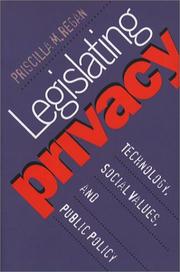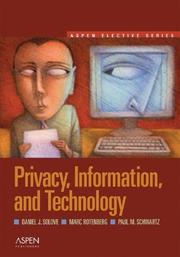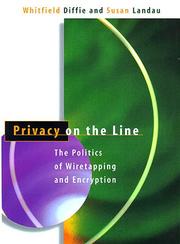| Listing 1 - 10 of 26 | << page >> |
Sort by
|
Book
Abstract | Keywords | Export | Availability | Bookmark
 Loading...
Loading...Choose an application
- Reference Manager
- EndNote
- RefWorks (Direct export to RefWorks)
Book
ISBN: 9781479881703 1479881708 Year: 2016 Publisher: New York, N.Y. New York University Press
Abstract | Keywords | Export | Availability | Bookmark
 Loading...
Loading...Choose an application
- Reference Manager
- EndNote
- RefWorks (Direct export to RefWorks)
"This is going on your permanent record!" is a threat that has never held more weight than it does in the Internet Age, when information lasts indefinitely. The ability to make good on that threat is as democratized as posting a Tweet or making a blog. Data about us is created, shared, collected, analyzed, and processed at an overwhelming scale. The damage caused can be severe, affecting relationships, employment, academic success, and any number of other opportunities—and it can also be long lasting. One possible solution to this threat? A digital right to be forgotten, which would in turn create a legal duty to delete, hide, or anonymize information at the request of another user. The highly controversial right has been criticized as a repugnant affront to principles of expression and access, as unworkable as a technical measure, and as effective as trying to put the cat back in the bag. Ctrl+Z breaks down the debate and provides guidance for a way forward. It argues that the existing perspectives are too limited, offering easy forgetting or none at all. By looking at new theories of privacy and organizing the many potential applications of the right, law and technology scholar Meg Leta Jones offers a set of nuanced choices. To help us choose, she provides a digital information life cycle, reflects on particular legal cultures, and analyzes international interoperability. In the end, the right to be forgotten can be innovative, liberating, and globally viable
Human rights --- Privacy, Right of --- Privacy, Right of - United States --- Privacy, Right of - Europe
Book
ISBN: 081331657X 0813316561 9780813316567 9780813316574 Year: 1993 Volume: *2 Publisher: Boulder, Colo. Westview
Abstract | Keywords | Export | Availability | Bookmark
 Loading...
Loading...Choose an application
- Reference Manager
- EndNote
- RefWorks (Direct export to RefWorks)
Book
ISBN: 3161462432 9783161462436 Year: 1995 Volume: 7 Publisher: Tübingen Mohr Siebeck
Abstract | Keywords | Export | Availability | Bookmark
 Loading...
Loading...Choose an application
- Reference Manager
- EndNote
- RefWorks (Direct export to RefWorks)
Book
ISBN: 9780262529860 0262529866 Year: 2016 Publisher: Cambridge, MA : The MIT Press,
Abstract | Keywords | Export | Availability | Bookmark
 Loading...
Loading...Choose an application
- Reference Manager
- EndNote
- RefWorks (Direct export to RefWorks)
With Obfuscation, Finn Brunton and Helen Nissenbaum mean to start a revolution. They are calling us not to the barricades but to our computers, offering us ways to fight today’s pervasive digital surveillance—the collection of our data by governments, corporations, advertisers, and hackers. To the toolkit of privacy protecting techniques and projects, they propose adding obfuscation: the deliberate use of ambiguous, confusing, or misleading information to interfere with surveillance and data collection projects. Brunton and Nissenbaum provide tools and a rationale for evasion, noncompliance, refusal, even sabotage—especially for average users, those of us not in a position to opt out or exert control over data about ourselves. Obfuscation will teach users to push back, software developers to keep their user data safe, and policy makers to gather data without misusing it.Brunton and Nissenbaum present a guide to the forms and formats that obfuscation has taken and explain how to craft its implementation to suit the goal and the adversary. They describe a series of historical and contemporary examples, including radar chaff deployed by World War II pilots, Twitter bots that hobbled the social media strategy of popular protest movements, and software that can camouflage users’ search queries and stymie online advertising. They go on to consider obfuscation in more general terms, discussing why obfuscation is necessary, whether it is justified, how it works, and how it can be integrated with other privacy practices and technologies.
Book
ISBN: 9780521194914 9780511676161 0521194911 Year: 2010 Publisher: Cambridge Cambridge University Press
Abstract | Keywords | Export | Availability | Bookmark
 Loading...
Loading...Choose an application
- Reference Manager
- EndNote
- RefWorks (Direct export to RefWorks)
This volume provides a comprehensive analysis of civil liability for invasion of personality interests in Europe. It is the final product of the collaboration of twenty-seven scholars and includes case studies of fourteen European jurisdictions, as well as an introductory chapter written from a US perspective. The case studies focus in particular on the legal protection of honour and reputation, privacy, self-determination and image. This volume aims to detect hidden similarities (the 'common core') in the actual legal treatment accorded by different European countries to personal interests which in some of these countries qualify as 'personality rights', and also to detect hidden disparities in the 'law in action' of countries whose 'law in the books' seem to protect one and the same personality interest in the same way.
Personality (Law) --- Privacy, Right of --- Torts --- Personality (Law) - Europe --- Privacy, Right of - Europe --- Torts - Europe --- Personality (Law) - United States --- Privacy, Right of - United States --- Torts - United States

ISBN: 0807864056 0585028001 9780585028002 9780807837795 0807837792 9780807864050 0807822264 9780807822265 0807845329 9780807845325 9798890869395 Year: 1995 Publisher: Chapel Hill University of North Carolina Press
Abstract | Keywords | Export | Availability | Bookmark
 Loading...
Loading...Choose an application
- Reference Manager
- EndNote
- RefWorks (Direct export to RefWorks)
While technological threats to personal privacy have proliferated rapidly, legislation designed to protect privacy has been slow and incremental. In this study of legislative attempts to reconcile privacy and technology, Priscilla Regan examines congressional policy making in three key areas: computerized databases, wiretapping, and polygraph testing. In each case, she argues, legislation has represented an unbalanced compromise benefiting those with a vested interest in new technology over those advocating privacy protection. Legislating Privacy explores the dynamics of congressio

ISBN: 0735562458 0735564116 9780735564114 9780735562455 Year: 2006 Publisher: New York, N.Y. Aspen
Abstract | Keywords | Export | Availability | Bookmark
 Loading...
Loading...Choose an application
- Reference Manager
- EndNote
- RefWorks (Direct export to RefWorks)
Privacy, Information, and Technology, with its comprehensive approach, is ideal for use in cyberlaw, law and technology, privacy law, and information law courses and seminars.Features include: Perfect addendum for instructors wanting to cover information privacy issues in more depth in their courses and provides material for one to three weeks worth of class instruction. It is a great addition to courses in communications, media, cyberspace, information society, and technology Extensive and clear background about the law and policy issues relating to information privacy and computers, databases, and the Internet Useful in undergraduate and graduate courses for an introduction to information privacy and technology issues because it explains the law clearly for the layperson Introductory chapter provides comprehensive thought-provoking philosophical discussion of information privacy Covers emerging information technologies: computer databases, RFID, cookies, spyware, and data mining Covers new issues such as privacy and access to public records, government access to personal information, airline passenger screening and profiling, data mining, identity theft, consumer privacy issues, and financial privacy
Human rights --- United States --- Privacy, Right of --- Data protection --- Law and legislation --- Privacy, Right of - United States --- Data protection - Law and legislation - United States --- Acqui 2006 --- United States of America

ISBN: 0262041677 0262541009 0262271745 0585002878 9780262041676 Year: 1998 Publisher: Cambridge, Mass. : MIT Press
Abstract | Keywords | Export | Availability | Bookmark
 Loading...
Loading...Choose an application
- Reference Manager
- EndNote
- RefWorks (Direct export to RefWorks)
Wiretapping --- Data encryption (Computer science) --- Privacy, Right of --- Law and legislation --- #SBIB:309H1015 --- Media: politieke, juridische, ethische, ideologische aspecten (incl. privacy) --- Wiretapping - United States --- Data encryption (Computer science) - Law and legislation - United States --- Privacy, Right of - United States
Book
ISBN: 2894514522 9782894514528 Year: 2000 Publisher: Cowansville: Blais,
Abstract | Keywords | Export | Availability | Bookmark
 Loading...
Loading...Choose an application
- Reference Manager
- EndNote
- RefWorks (Direct export to RefWorks)
Les hommes et les femmes de tous les temps ont toujours fait la preuve qu'ils étaient épris de liberté, ayant même, à certaines époques, donné leur vie pour cette idée. Depuis l'adoption de la Charte canadienne des droits et libertés, la protection de la vie privée est devenue l'une des assises sur lesquelles repose la démocratie canadienne. Le droit constitutionnel au respect de la vie privée est le mécanisme par lequel les tribunaux (le pouvoir judiciaire) contrôlent les pouvoirs législatif et exécutif. Il est donc intrinsèquement lié aux pouvoirs des tribunaux de contrôler la constitutionnalité des lois. Cet ouvrage trace un portrait vivant et saisissant de cet enjeu fondamental qu'est la protection de la vie privée en droit constitutionnel canadien et américain et en droit international. Prenant comme postulat de base que toute intervention des pouvoirs publics sans consentement des individus est inconstitutionnelle, l'auteur démontre l'importance fondamentale de ce droit dans les sociétés libérales caractérisées par l'ère de l'information.
Privacy, Right of --- Civil rights --- Constitutional law --- Droit à la vie privée --- Droits de l'homme --- Droit constitutionnel --- Droit à la vie privée --- Privacy, Right of - Canada --- Privacy, Right of - United States --- Canada --- États-Unis
| Listing 1 - 10 of 26 | << page >> |
Sort by
|

 Search
Search Feedback
Feedback About UniCat
About UniCat  Help
Help News
News